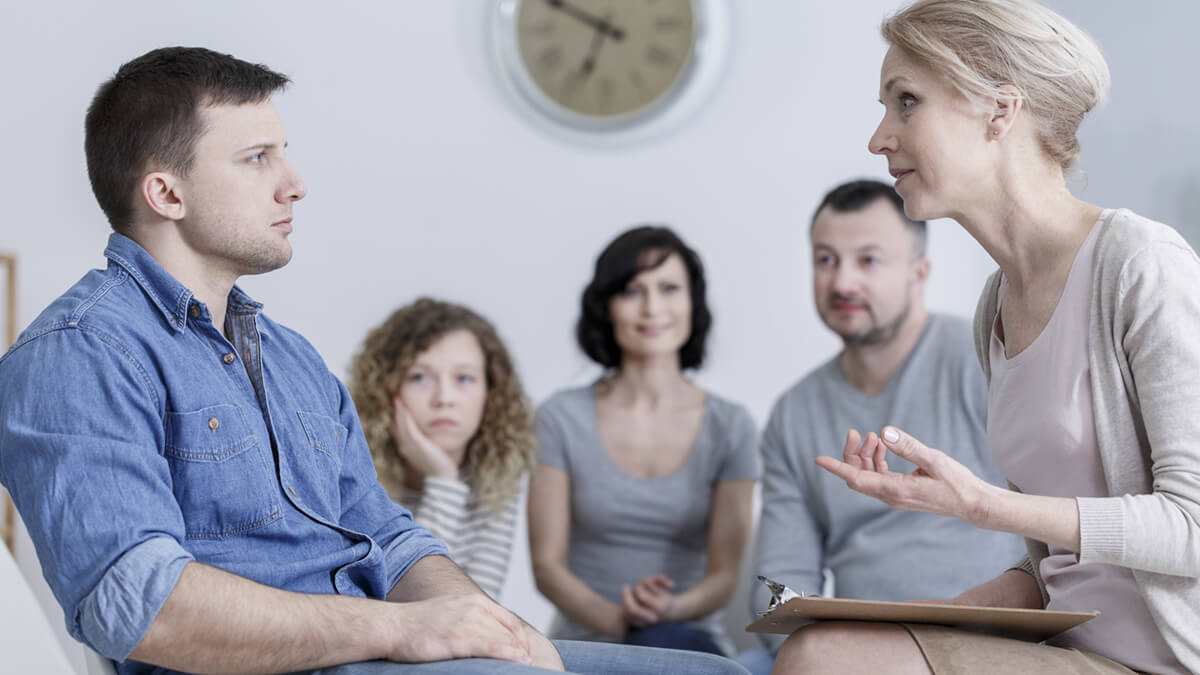When someone you love lives with a serious mental illness, the effects extend well beyond the individual and can impact the lives of family and friends. As with most serious illnesses, having a support system in place can be the differentiating factor.
Family psychoeducation helps individuals suffering from mental illness to stay courageous in the face of seemingly insurmountable challenges. It is a growing field within psychiatric rehabilitation that provides families with information about mental illness and teaches the skills necessary to best support a loved one with a mental illness. In addition, families often find comfort in knowing that other families are experiencing similar situations every day. Conducted by mental health professionals holding a doctorate in psychology or a master’s degree in clinical mental health counseling, family psychoeducation is usually offered as part of an overall clinical treatment plan for an individual with such illnesses as bipolar disorder, major depression, obsessive compulsive disorder, and borderline personality disorder.
“Psychoeducation literally means being more aware or having more information than before. Family members have an opportunity to learn what mental illness is and how it affects their loved ones. Family members can also gain a better understanding of what symptoms to look for so that they can help a loved one access the appropriate services much sooner, potentially avoiding an unhealthy situation,” said Dr. Veronica Carey, chair of the Psychiatric Rehabilitation Association’s (PRA) Academy of Psychiatric Rehabilitation and Recovery, a consultant to the state office of mental health in Pennsylvania, and a Walden University faculty member.
During family psychoeducation sessions, participants learn techniques for fostering hope and recovery. This can include reducing stress, improving communication, and strengthening relationships. “The main goal is to give families an increased awareness,” says Dr. Carey. “Oftentimes the family views the illness with a sense of loss, but it’s really about how capable the individual is. Psychoeducation can help families understand what capabilities, as well as symptoms, the patient may have.”
In terms of supporting the loved one with mental illness, the results of family psychoeducation and rehabilitation are well worth the effort. They include reduced hospitalization, fewer relapses, less depression and anxiety, better job opportunities, and an overall stronger sense of control. Individuals who are managing their illness well are also more involved in family life and social activities, which is a big plus for families as well.
Family psychoeducation has the potential to touch many lives. In fact, according to the National Institute of Mental Health, mental disorders are common throughout the United States, affecting more than 45 million people each year. Of this group, fewer than half receive treatment.1 This suggests there is a great opportunity and need not only for psychiatric rehabilitation programs but for family psychoeducation services as well.
If you are interested in a career where your work helps individuals and families overcome obstacles so that they can live a better life, you may want to consider earning an online psychology degree. Holding a PhD in Clinical Psychology helps ensure that you have the professional skills and credentials to be an effective practitioner in the field.
Walden University is an accredited institution offering a PhD in Clinical Psychology degree program. Expand your career options and earn your degree in a convenient, flexible blended format that fits your busy life.
Dr. Veronica Carey, PhD, CPRP, is a Walden University faculty member, chair of the PRA’s Academy of Psychiatric Rehabilitation and Recovery, and a consultant to Pennsylvania’s Office of Mental Health and Substance Abuse Services. Her articles on direct care staff development in community-based treatment settings have been published in Psychiatric Rehabilitation Journal® and Psychiatric Services.
1Source: https://www.nimh.nih.gov/health/statistics/mental-illness.shtml
Walden University is accredited by The Higher Learning Commission, www.hlcommission.org.




